In 2018, there were two front-page articles in major newspapers about loneliness and social isolation in older adults. “Loneliness kills,” read one headline, a quote from former U.S. Surgeon General Dr. Vivek Murthy.
But it was the second story that turned heads. British Prime Minister Theresa May appointed a minister for loneliness. There will also be a government fund to develop strategies and opportunities to tackle the issue.
Why the attention now? Through studies and anecdotally, scientists and clinicians are finding that loneliness and social isolation are much more than just unpleasant … they can be fatal.
Fallout includes a damaged immune system and increased inflammation leading to heart disease, depression, anxiety, dementia — and even an early demise.
How Many Older Adults Suffer from Loneliness?
Clearly, you can live alone and not be lonely, or live with others and feel desperately alone. You can be 18 or 80. But, it happens more as baby boomers lose social connections, opportunities, and people they care about.
Consider these facts:
- A 2015 study from Brigham Young University, tracked 3.5 million people over 35 years and attributed loneliness to a 26-32% rise in early death.
- Loneliness can be as destructive as smoking 15 cigarettes a day or being obese.
- Medicare data shows a lack of social contacts (social isolation) among older adults adds an estimated $6.7 billion to government spending yearly.
- In another study, 40% of adults ages 62-91 report that they are occasionally or frequently lonely.
- Loneliness is so pervasive that CareMore, a subsidiary of Anthem, has professionals screen for loneliness during appointments for older adults. (Note: they’ve also appointed a “Chief Togetherness Officer.”)
Why Are Older Adults Lonely and Disconnected?
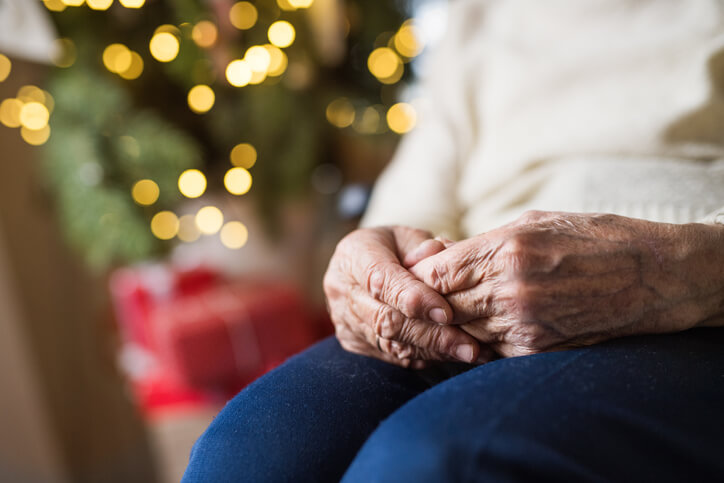
Not to be grim, but along with life’s many benefits, the longer you live, the more losses you will experience. It’s simple math. It might be the death or illness of a beloved parent, spouse or partner, or dementia.
Sometimes, it’s missing regular interaction with colleagues after retirement or not having a sense of purpose. Or, geography: adult children and grandchildren may live far away (or even be close by but not have much of a relationship); friends may move to be near their families or start over someplace new.
Not having money to go out to restaurants, movies or fun activities that involve other people can limit opportunities, as can mobility issues. There are six million age 65+ who live alone with a disability.
What compounds late life challenges may be not having a partner. More than one third of all adults age 50+ are single–widowed, never married or divorced. And, happening increasingly is “grey divorce,” where long married couples call it quits. With increased longevity and health, some spouses decide they’ve grown apart.
Whether you’re newly widowed or navigating divorce, The Hartford offers free, downloadable PDFs developed by The Hartford’s corporate gerontologists to help guide you through this transition.
There’s the issue of housing, too. Most Americans want to age in place, but it can be isolating. That charming cottage in the woods you once adored could become a barrier to socializing, finding resources and feeling part of a community.
How Can You Help Tackle Social Isolation and Loneliness?
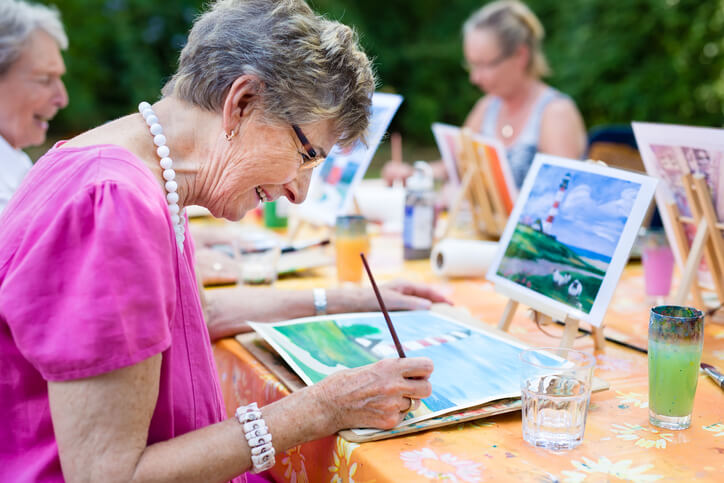
Now that people are acknowledging their feelings of loneliness, and researchers “get” the fallout of a life lacking in meaningful social connections, there’s a rigorous effort to mitigate the problem.
Here are four ways:
1.What’s keeping Mom or Dad from engaging with others.
Perhaps they feel that no one needs them, they don’t know what’s out there to do or how to go about meeting people. Do some “homework” and find out what the resources are in their community. Between their town senior center and their local Area Agency on Aging, you’ll get a good idea of social opportunities, from programs to community events.
Maybe they have no way to get around or aren’t able to. Again, their senior center can help. Is there something you might be able to do, whether it’s take them or get someone else to bring them to events? Lots of older adults have these issues. That’s why there are resources! Of course, if they live in a rural area, options may be more limited.
2. Think about housing options that promote relationships.
You could: share your home with one or more people; move to intergenerational or senior cohousing (you have your own place but can share meals and other activities); or become part of a niche community to be with others who share your interests or lifestyle (lifelong learning, LGBT, Jimmy Buffett). If you want to stay in your home, consider joining a “Village” created by older neighbors who want to age in place and offer access to resources (transportation, service providers) and social events.
3. Volunteer or give back.
Volunteering can boost people’s mental health and well- being, be very meaningful and it has great people-meeting potential. Getting involved in an intergenerational program can be especially energizing and self-affirming. If you love dogs, you could visit a local shelter. You might also want to bring your pet to visit nursing home residents. Or, some hospitals welcome volunteers to cuddle ICU newborns.
4. Reach out through technology.
That could be FaceTime, Skype, online forums, free classes on the web, Facebook or hobby-specific sites. There are sophisticated tablets and other devices such as GrandPad with multiple functions: through a special portal for family and friends, you can email, video chat with the grandkids, receive reminders, share photos or request a ride. If you can’t physically get to a senior center, some have virtual programs that allow you to participate from your home. If what you want is a companion, consider voice-first technology such as the soon to be available ELLIQ.
Today, today there is a government minister of loneliness and AARP’s Connect2Affect initiative to end social isolation among older adults. Tomorrow there will be even more ways to stay in touch and feel valued. In the meantime, there’s also conversing with Siri, Alexa or Google Home. Or, adopting a cat to cuddle!
Are you feeling isolated? The Extra Mile Community is here for you.
How have you overcome your personal struggles with loneliness? Are there any tips we missed that may inspire someone looking for help? Please leave a comment and help our fellow readers through these tough times. Share your ideas and thoughts in comments below.


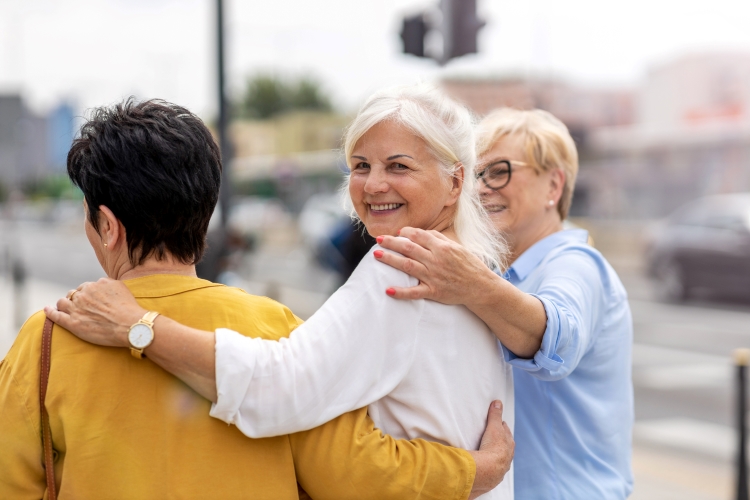

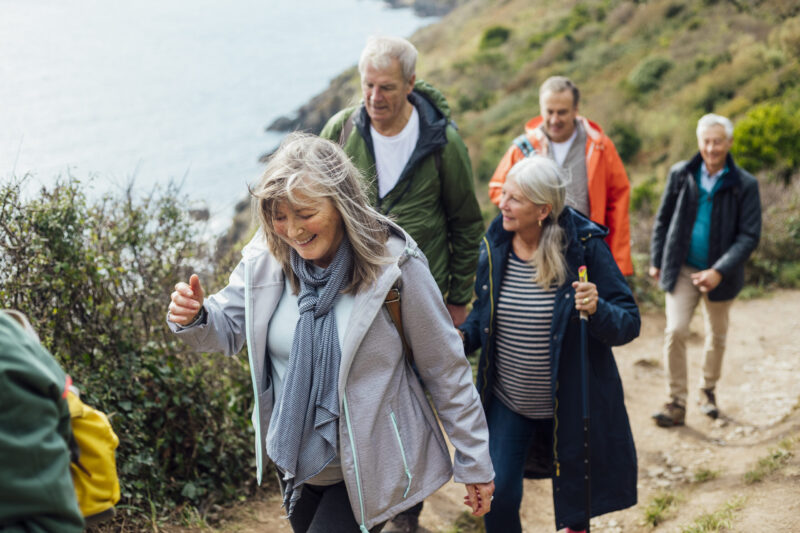
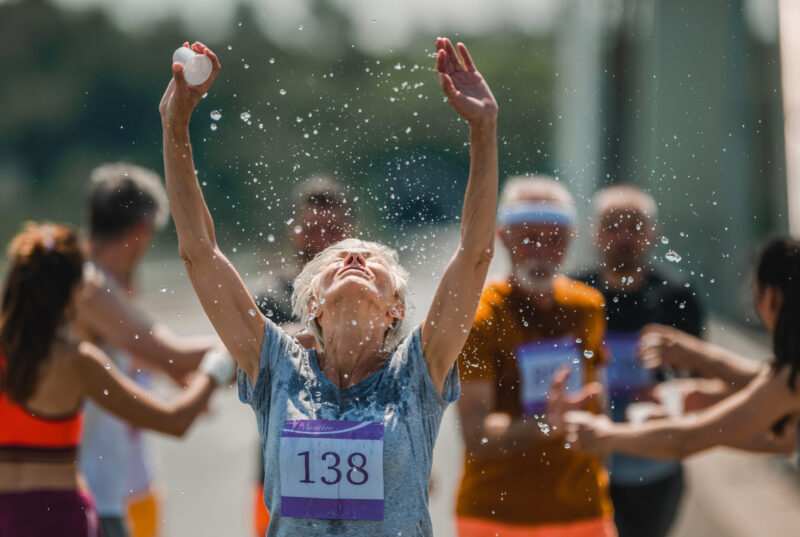

This is so true! We all need to do whatever we can to ensure the older adults in our lives have plenty of opportunities for socializing.
I liked it when you said town senior centers will give us a good idea of social opportunities that our loved ones can take part in. My sister checked before, and my mom refused because she has been experiencing a lot of back pain recently. Maybe bringing her to an assisted living facility will help. That way she can socialize while receiving the care she needs.
These are all wonderful ideas.
My husband of 31 years passed away suddenly last week (Feb. 4th) from cardiac arrest. I am still grappling with loss of social security income, trying to pay rent on my check only. I’m very fortunate that my two sons are helping me. I decided to continue keeping active weekly with my (3) 12-step group meetings and faith-based community, weekly hikes along the Trinity River trails, and with neighbors in our senior living apartment complex. I may want to go back to school or get a part-time job eventually. Right now, I’m just taking one day at a time, and working through the grief at age 72 with our cat Shadow. –Fort Worth, Texas
Hello, Marilyn. We are truly sorry to hear of the loss of your husband. Please accept our condolences.
Great Articles……I thought I was the only one that lives in this awful loneliness !
Thank you!
Unfortunately, there is one big thing you must change about yourself when you get old–and it is hard to do–you must change the way you have thought and lived all your life. You have to get used to being alone, you are forced to put up with the stigmatism of being old and many times, even if you can do these things, you are running out of money–that is huge. And, as always, your health comes first. If you can’t walk or drive and are in pain all the time, what can you do? Human beings are not made to live a long time. And those that do, suffer.
Thanks for mentioning the “Village” concept in section 2 above. I recently retired and joined a “Village” as a volunteer in Lewes, De, & greatly enjoy assisting older seniors with home visits & transportation to doctors appointments & grocery store trips. It not only helps the older seniors get out & socialize, but keeps me active & feeling good about doing something positive.
Thanks for article on “loneliness” so timely for today seniors I am 86 look much younger also do not feel my age but this put me in lmbo if I try to be with my age group they are not as active and the younger seniors really don’t want want someone my age with them Would like to find seniors like myself
I am almost 82. My husband passed 3 years ago. He had dementia. I really appreciated the Alzheimer’s site where you could read about the disease, post questions, just state what you were experiencing & get replies from others.
Thanks for sharing, Lois. We are sorry for your loss and appreciate you sharing what helped you through this time.
I hate to be alone especially at night. I cry myself to sleep. I don’t know what to do I am 70 and recently retired.
I have no family, no relatives and no friends left. I can no longer walk even to the corner anymore. Fortunately this article showed me how little I have to live for.
Thank you.
Interesting!
Thank you for this forum, I’m so glad I found it. I am 69 years old and keep trying to deny I am lonely, or feel like it’s my fault because I’m not social enough. At my age I have lost all my siblings, my ex-husband who was a close friend. I live in a very rural very small, close knit community where I moved to a few years ago to be closer to my children and grandchildren. But, they are all very busy. So, I am trying to figure out ways to integrate into this community. Thank you to everyone for sharing. I no longer feel quite as alone in this, and learning new ways to cope and also to reach out to others.
My remedies: Check out the local library and senior center in your community. My local senior center has free movies weekly plus a nice mix of activities 5 days a week. It is a great way to spend an afternoon among other people, Also see if your local library has any book clubs you can join. You can get together with others and have a lively discussion. If you have a local community center check out the availability of classes. I chose art and I love it and have made many friends. Don’t forget about church activities. That’s another way to connect with like minded people. If you don’t want to mingle, take up a hobby. That’s another wonderful way to keep busy and connected.
For decades I have had to deal with loneliness. Having sustained life altering and disabling injuries, with years of rehabilitation I eventually “attempted to enter a normal life”. This was a ‘silent injury’ where no visible signs of disability were present. A return to work did not happen as years of University education, skills, cognitive abilities and many other issues resulted in losses, which precluded my ability to return to my career or, even have a new one. Our careers have much to do with social interaction, status and of course income. When all of that goes…
With no skill sets, true work history or accommodations being made in the work place I turned to volunteer opportunities and found much satisfaction – social interaction (helping people living with disabilities)! Alas, the various programs that I volunteered for were slashed from the State and Federal budgets.
I completely agree with Items 1 – 3 as social – human contact is critical in keeping us going! “4. Reaching out to Technology” Is possible as an assistive device but after these many years I have witnessed folks further isolating them selves by relying on this only, literally holing up in the homes. Many times going to “dark” or negative places (think scammers, trolling, etc.) NOT good. Psychologists and others in the know have little evidence that looking on a screen provides adequate interaction. Yes, this can help in making contact and keeping in touch, but physical touch and true eye to eye contact is imperative.
I am 81 years old and involved in a wonderful group of women that we call Hi Tea! we meet once a week and just visit and share new ideas and serve wonderful treats. We have a retired chef in our group who is extremely creative and many others with special talents to share. We knit caps for babies, are always available to listen when a friend has a problem and always hear what they have to say with no judgments or negative responses. We started this group in 2000 when many of us had just reached retirement age. We average 12 to 15 people every week at the meetings and stay in touch with those who have moved away or gone into homes . It is a great group and I am very grateful to have them in my life. So here is another way to suggest to your followers to give themselves the joy of people to love and share life with. .
It’s hard to live with others and they are always on the cell phone and you feel alone anyway.
Being isolated is not having transportation, and having to depend on neighbors who are not always home!
Thank you for sharing,
Thank you, Robert Cleveland, for your intelligent, very thoughtful and positive comment. It was inspired and for many, what we need most. For many, what is ‘healing’ or ‘energizing’, is finding that our thoughts are shared. I am sad to see that in all these suggestions, not much mention is made of writing, of music, of stimulating however we find challenging, the creativity within ourselves.
Bring some music in your life. There’s a lot of instruments that don’t require a great deal of skill to play and enjoy. Consult a music therapist and find one that fits your need and physical condition then get together with others and jam baby JAM !
Music saved my life at 14 now at 85 it’s still saving my life. I’m still JAMMING BABY.
Everything is a “state of mind” and a state of mind can easily kill. Loneliness is toxic, and for many it’s like drowning. If there is no one to pull them out of the water they cannot survive. Unfortunately many family members only see a lonely parent or grandparent as needy and annoying.
Great article! Read the posts and can relate to them as I experience the same issues and feelings. Would be nice if there were a site where we could communicate back and forth. Similar to a caregivers site but just a friendship site. I would be interested in being a facilitator for an AARP site such as that.
At 73 I lost my husband after spending 24/7 days with him for one year at MD Andersen Cancer Hospital. We were married for 51 years. I was devastated. Two children worried about me. I took a deep breath and went from TX to MN to attend a high school class reunion, cane and bum leg too! I had gone to this school for only my Senior year so they were really reaching out! I had a glass of wine an decided to go back to the hotel … did not know a soul, when I felt a tap on my shoulder. It was an old boyfriend from the fun summer in 1964. Then the draft called and he joined the Marines. I went on and married my husband. His wife died a year ago and my husband a mere 3 months. We were both lonely, and took a leap of faith. I drove with him to his home in Seattle, and stayed or a week. He has flown to TX and stayed. I am building a house and he is selling his and moving in with me. We both feel incredibly LUCKY!
Hello, Connie. We are truly sorry to hear of the loss of your husband. And thank you for sharing your beautiful story. Best of luck to both of you in Seattle!
Loneliness is just a state of mind, that is the obvious what is not so is being alone in a world of distractions that either bind our thoughts or fix them into a state of confusion that is unreconcilable to our detriment. Therefore having a singular goal is the binding force that brings our desires into focus and gives life meaning without the need for companionship which is a distraction in itself and is a denial of life’s requirement for change in a evolving universe.
I’d love to see zoning and regulations that eventually will actually encourage families to remodel or to add a little apartment onto their homes to accommodate elderly parents or friends. It’s the way of the future ( and the past!)
With my Mother living far from where i am and having young grandchildren which she didn’t get to see often, and not having many people to talk to due to her limited technological abilities, i could sense that she was lonely and sad except when in communication with her family and in particular grandkids.
I did some research and Purchased her a seniors video phone from Konnekt . its simple to use and we talk regularly through skype and she is so happy when she gets to see her grandkids and they love being able to show her cool toys which she loves. its amazing that something simple can prevent her from being lonley and isolated.
I would recommend to place your elderly parents in assisted living facilities where they have an opportunity of socializing with others, which in turn encourages them to adopt healthy habits, while at the same time they also experience enhanced physical health.
I was 79, going on 90, after four years of mourning the loss of the love of my life. Some friends mentioned they were learning ballroom dance. “That would be ideal, if only I had a partner with whom I could take lessons”, I replied. They informed me that a dance partner wasn’t necessary. I signed up and 9 months later, I’m 79, going on 60.
Bobbie- we are so sorry for your loss. Thank you for sharing this inspiring story!
47 years happily married before wife passed. Been active in church for many years through volunteering bldg. Maintenance and group activities to include trustee chair, preschool committee etc. Keep your mind busy and stay active. Met many new friends who care for me lately. Happier every day.
Dennis, we are sorry for the loss of your wife but appreciate you sharing your experience. Thank yoU!
Great information. I found this article very helpful when searching for a solution to this issue for a senior loved one.
Cora- thank you for your feedback. We greatly appreciate it!
Very nice article. I am very fortunate i drive and still healthy enough to get around. I am 90 years old and feel privileged. Keep up the good work.
Hi Frank, thanks for your feedback!
An elderly cousin sent this to me, I totally enjoyed ALL. Of the comments , lots of good information Thank you
Gail- we’re glad you enjoyed this! Subscribe to our emails to get more information on a monthly basis.
I volunteered at CT.HOSPICE for 9 years,but had to give it up because of hearing loss.I am thinking of helping out at a local soup kitchen,or a food bank,My wife passed away 15 years ago,and I felt it a privilidge,an honor,and a blessing to help out,while keeping my mind occupied,and surrounded by friendy people,who I grew to Love.
My wife passed a year ago this coming Oct 10 I was reading on my computer about people learning to live in a lonely life, it is the most awful thing I have ever been through , if there is a way to feel more at ease , please comment , I live out in the country so there is very few neighbors that I know in fact only one that we talk and only once in awhile all of my kids live in other states or in Denver , I live in DURANGO COLO so our get together is far and in between one lives in Farmington New Mex , and that is forty five miles from here , the others live in DENVER or ALBQ NEW MEX SO any comments ?????? also I am in my eighty,s BEN
Hi Ben, we are sorry for your loss. We hope that these tips can help you during this transition period.
Thanks for caring about this incredibly important subject. As I walk through these later years of life, alongside my wife who is now experiencing “short-term memory loss“ and much confusion… The drain on energy and the introduction of stress is heavy. I would like to add to your excellent list of “helps” and guidance… The idea of finding a church or house of worship that really cares about and is sensitive to elder needs. Assuming the church understands the significance of “community” and meaningful “fellowship”…This could be a place where one can develop meaningful, supportive, and encouraging relationships that becomes like “family”… this arrangement has made a wonderful contribution to my own battle with loneliness .
Hi Holland, thank you for your wonderful advice. We are glad to hear that you have found a place that is helping with your own personal battle with lonliness.
I took care of my Mother for the maybe ten years of her life, we lived together for eighteen years, now she’s passed, I’m lost and have medical issues, and islotion.
Can’t stay strong , things hit is suddenly and I will cry for ever. What to do!
Nice suggestions ,
Where do I volunteer in the Pittaburgh Pa, area
What if u are disabled and don’t drive, how do u get involved somehow, someway
Karen,
I feel your pain! You are right. Loneliness is endemic everywhere but if you are disabled it is even more of a challenge. I would find out what resources your local Area Agency on Aging or senior center has. Do they offer transportation that can get you to a program? They will steer you to these programs.
Do you live in a neighborhood that is part of the Village-to-Village Network? The Village concept is all about connecting neighbors who live alone. There are typically social opportunities and activities designed so you can spend time with neighbors who are also living on their own. The Villages often have vetted service providers, many times for a discounted fee, and someone at the Village who can arrange transportation and help you get involved.
In my article, I mention that housing and social media are good ways to stay connected. They are! On the Internet you can connect with others who have similar interests and situations. You can listen to books, play games with others (bridge, for instance), learn a new skills on Youtube, or take an online course.
For good reason, loneliness is a hot topic in the press. And that means increasingly there are going to be more opportunities to socially interest, whether disabled or not. Hope this helps.
This is so true for the widow – It is hard being a third wheel – Not to many people want to be bothered because there is nothing in common with either spouse which ever one goes first – Family to me was not enough so I went to volunteering at the hospital to help others and get connected with other friends like me -Would recommend it for everyone .
Great article …. My wife passed away in September 2016 after 40 years of married life. Very often this happens to elderly couples and it leaves the remaining spouse lost and lonely. I believe most happily married couples look forward to ‘Growing Old’ together but too often one outlives the other. In my case, I made it a point to get involved in activities and set goals doing things each day to make my life interesting. The first thing I did was get involved with in a ‘Grief Class’ which was very helpful. In my case, I had no interest in cooking or doing House Work, so it was difficult learning how to become a ‘Whole Person’ again. Consequently I now have many ‘New Friends’ who share experiences, entertainment and life together. When I feel loneliness setting in I call a friend or get out and do something interesting.
Wish Medicare sent articles like this one to every senior in the country. Love the idea of a special “tablet” for an aging parent—also a social robot!
Thanks for this info.
Great, informative article….so timely and significant.